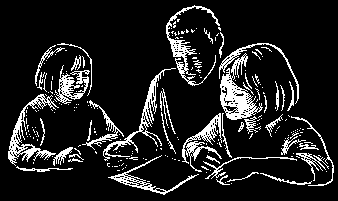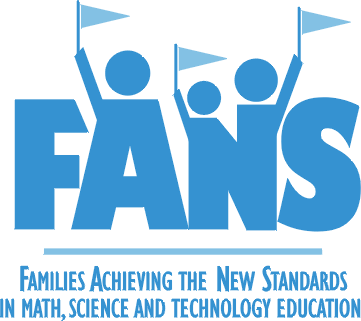HOW CAN I GET FURTHER INVOLVED IN IMPROVING MATH, SCIENCE, AND TECHNOLOGY EDUCATION?
Family members can be very helpful in the efforts to reform math, science, and technology education. If you are interested in getting further involved, here are some things that you can do:
Get Involved at Your Child's School
Visit your child's school often. Get to know the teachers and the principal, and ask questions about what your child is learning. Offer to serve as a teacher's aide in your child's classroom. Find out if the teachers have adequate materials for teaching math, science and technology. Ask if they have time to attend workshops and conferences to learn about new materials and methods.
Join your school's parent-teacher organization. Encourage it to sponsor math, science and technology events, activities, and even classes for parents; volunteer to help make such programs happen.
Encourage your school or community group to have a FANS Workshop for one or more groups of parents. Find out how to sponsor events for parents and children during Math, Science, and Technology Month each April. Information about all these activities can be obtained from the New Jersey Mathematics Coalition at 732-445-2894 or from http://dimacs.rutgers.edu/nj_math_coalition/.

Attend a FANS follow-up conference. Call for information.
Suggest that your school sponsor a family involvement program. For information about Family Math, Family Science, or Family Tools and Technology, contact the Center for Family Involvement in Schools, Rutgers University, Bldg 4090, Livingston Campus, New Brunswick, NJ 08903 (732-445-2071). Your school might also sponsor a family program offered by zoos and museums listed in the pamphlet What Resources Are Available for Families?
Read More Information
These sources provide in-depth information about why reform is necessary, and what is being done at the state and national levels.
Everybody Counts: A Report to the Nation on the Future of Mathematics Education, 1989, 114 pages, Mathematical Sciences Education Board. Available from National Academy Press, (800-624-6242).
Every Child a Scientist: Achieving Scientific Literacy for All, 1998, A 26-page parents guide to the science standards. National Academy Press, (800-264-6242, http://www.nap.edu/bookstore).
Science for All Children: A Guide to Improving Elementary School Science in Your District, 1997, National Academy Press.
Science for All Americans: Project 2061, 272 pages, published in 1990 by the American Association for the Advancement of Science. Available from Oxford Univ. Press, (800-451-7556).
National Science Education Standards, 1996, 262 pages, National Research Council. Available from the National Academy Press (800-624-6242).
Curriculum and Evaluations Standards for School Mathematics, 1989, National Council of Teachers of Math., (800-235-7566)
Technology: Report of the Project 2061 Technology Panel, 1989, American Association for the Advancement of Science.
Technology for All Americans: A Project to Develop National Standards for K-12 Technology Education. Available from the International Technology Educ. Association, (703-860-2100).
New Jersey Mathematics Curriculum Framework, 1996, 688 pages. Published by the NJ Mathematics Coalition in collaboration with NJ Dept of Education. http://dimacs.rutgers.edu/nj_math_coalition/
New Jersey Science Curriculum Framework, 1998. Published by the NJ Dept of Education in partnership with the Merck Institute for Science Education. See http://www.state.nj.us/education or call the Publications Distributions Office at 609-984-0905.

Contact State and National Organizations
The New Jersey Mathematics Coalition. Its goals are to improve mathematics education in the state and the public's understanding of mathematics. For a free newsletter or more information about coalition activities call (732-445-2894). http://dimacs.rutgers.edu/nj_math_coalition/
New Jersey's Statewide Systemic Initiative. The NJ SSI is a statewide partnership for strengthening mathematics, science, and technology education for all New Jersey students. NJ SSI, Rutgers University, Bldg 3870, Busch Campus, Piscataway, NJ 08855-1179 (732-445-2241). http://dimacs.rutgers.edu/~njssiweb
New Jersey State Department of Education, Public Distribution Office, P.O. Box 500, Trenton, New Jersey 08625-0500. Ask for parent information about the NJ Core Curriculum Standards in English or in Spanish, (609-984-0905).
U.S. Department of Education, Office of Educational Research and Improvement, Consumer Information Center, Dept H-374A, Pueblo, CO 81009. Ask for publications about how parents can help children learn math and science. Check out the Parents Guide to the Internet at http://www.ed.gov/pubs/parents/internet/
American Association for the Advancement of Science. For a catalog, write to AAAS, EHR Publications, P.O. Box 97066, Washington, DC 20090 or call 800-351-7542.
Ask the organizations below for information about how parents can help children learn mathematics, science, and technology, or how to support efforts to improve education in these areas:
National Council of Teachers of Mathematics, 1906 Association Drive, Reston, VA 22091-1593 (800-235-7566).
National Science Teachers Association, 1840 Wilson Blvd., Arlington, VA 22201-3000 (703-243-7100).
International Technology Education Assoc., 1910 Association Drive, Reston, VA 22091-1539 (703-860-2100).
